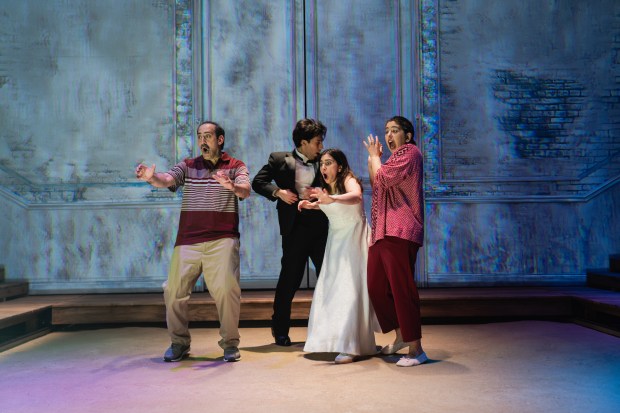An apt subtitle for Atra Asdou’s “Iraq, But Funny” might be: “How the British Caused Every Problem in the Middle East (With a Late Assist from the U.S.A.).”
It always cracks me up how, in progressive artistic circles, Brits are exempted from the pervasive disdain for stereotyping. Asdou leans into all of it with confident impunity: the accent, the physical appearance, even the quality of one’s teeth. Substitute any other nation and she’d be canceled forthwith.
Luckily, Asdou, a veteran of the Second City, also is exceptionally funny and there are moments when the latest, massively ambitious show at Lookingglass Theatre struck me as an astonishingly brilliant first theatrical play, even though it will almost certainly infuriate a decent percentage of the audience that has historically supported that particular theater. It annoyed me, too, in places, especially in its determination never to consider the relative merits of other narratives and, more specifically, its lack of a full consideration of the geopolitical impact of the Holocaust, not to mention the British success in fighting against Nazi sympathizers in the mid-century Middle East. But in others, it took my breath away. And, for the record, I believe from the tip of my head to the bottom of my toes that satirists have no obligation whatsoever to be fair.
In essence, Asdou has forged a one-night history of the Middle East from the perspective of Iraqi Assyrians, some of whom have, of course, now settled in the Chicago area. The storyteller is an English, Sgt. Pepper-like buffoon and the style is best described as a blend of Monty Python and Howard Zinn. It reminded me most of a similarly cartoon-styled telling of the history of the same region from the perspective of the Palestinian people that I watched a couple of years ago in a museum inside The Walled Off Hotel, outside Bethlehem in the West Bank. But that was on film; the motor-mouthed Asdou puts it out herself, live and in person.
I suspect that Lookingglass was knocked out by the script and basically just told Asdou and director Dalia Ashurina to go ahead and express themselves. But they still have to make it great.
In essence, Asdou has created two separate shows and spliced them together. One is a familial story about multiple generations of Iraqi Assyrians (played by Susaan Jamshidi, James Rana and Sina Pooresmaeil) and the struggles of a smart young daughter (Gloria Imseih Petrelli) to both honor the sacrifices of her parents and strike out on her own. The second show is Asdou’s British alter-ego explaining the history of how everything led to everything in the Middle East.
The first one is funny and sometimes quite moving, but despite the references to reclaiming one’s own story from someone else’s voice, it’s also a very familiar narrative when the Midwest-based children of immigrants from Iraq and Iran write plays. I’ve reviewed a version of it three times already this season in Chicago: it’s at the core of Sadieh Rifai’s “The Cave,” Michael Shayan’s “Avaaz” and Esho Rasho’s “Dummy in Diaspora,” also told from an Assyrian perspective. Those are diverse shows in many ways, my point is that the children of the diaspora are telling their own stories. I, for one, am glad to hear them.
But the comedic, opinionated political history with zany graphics, audience interaction, physical clowning, improvisational antics fueled by political outrage and one hilariously caustic line after another? No one else is doing that. Not at this level.
I don’t think Asdou has to drop her family story entirely but this style of satirical theater would work far better at around 90 minutes than almost two and a half hours; that’s why Second City pays close attention to length. If Asdou could force herself to cut her weaker material and repetitions and keep the familial arc more fully in the context of her lead comedic character and the geopolitical history that character is telling, she’d really have something here. Right now, that character drops away at the end after morphing into Uncle Sam without explanation. That’s all part of the standard anti-colonialist/anti-capitalist narrative, I know, but it still needs explaining for those at the back.
Asdou wants her family to triumph and, for the most part, and with this capable director’s help, she manages to skillfully navigate her twin impulses of moralistic political activism and sharp-elbowed satirical destruction, even though they are actually contradictory when it comes to their artistic obligations. But the core of this piece is political, not “thanks Mom and Dad, for all you did,” and that is something Asdou has to face if she wants a show that’s viable as well as heartfelt.
But after one more draft? Sensational, potentially. Already, if I were a scout looking for colossal young talent, I’d jump on a plane, buy a ticket and see what Asdou can do.
Chris Jones is a Tribune critic.
cjones5@chicagotribune.com
Review: “Iraq, But Funny” (3 stars)
When: Through July 20
Where: Lookingglass Theatre, 163 E. Pearson St.
Running time: 2 hours, 25 minutes
Tickets: $30-$90 at lookingglasstheatre.org



